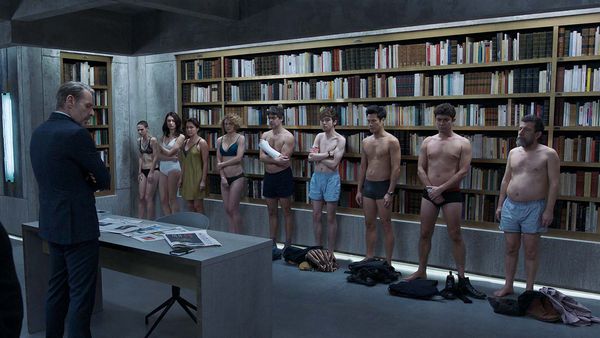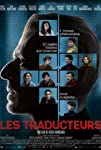Eye For Film >> Movies >> The Translators (2019) Film Review
The Translators
Reviewed by: Andrew Robertson

The Translators (Les Traducteurs) is a twisty little thriller. Its decaglot sensibilities are mirrored across multiple perspectives and a stream of revelation that shades Apocalyptic even without its setting of a private nuclear bunker.
Reuniting director Régis Roinsard with his writing partnership for 2012's Populaire, Daniel Presley and Romain Compingt, this is a film that rations its mysteries, pacing itself and creating new depths through parallels and positional changes. There are some genuine moments of surprise, not unearned, and it has a convincing escalatory element. For all that much of the action takes place underground, online, the emergence of certain actions into the cold light of day is what gives it much of its weight.

In a cast this large it seems churlish to single anyone in particular out, but a central trio deserve plaudits - publisher Eric Angstrom (Lambert Wilson) has made his fortune (and bet a larger one) on the success of the Dedalus trilogy. Katerina Anisinova (Olga Kurylenko) is the Russian translator who associates closely with the woman whose death is the core of the trilogy, and Alex Goodman (Alex Lawther, in transition from 'young...' and TV roles) is the English translator of these French works - but that in and of itself isn't as complicated as it will be.
There are plenty of turns to the tale - I'm not sure any are unearned - I was minded of Knives Out not just because of the presence of publishing (and murder mystery at that) but a particular combination of Chekhov's shoulder holster and depth of cast, and, truth be told, a certainty that however much some would like it others would not. There is a film that I absolutely would mention as one to which Les Traducteurs owes a debt, and not a small one, but in the very act of mentioning it I would, much like a DVD menu, potentially give away something that would rob a moment of its power. The line-up at the start, the artificial caged birds, the titles, all suggest something going on, but one of the problems with translation is the risk that you'll have heard it before. Yet saying that (and storytelling is much a part of this), I have few qualms in saying that at least one of the reversals is itself reversed, that there's more going on here than it first seems.
This starts as a chamber mystery about blackmail where everyone involved is massively aware of genre conventions, and from there furls and folds into something else. There's no external detective, but there is a stately home. There's a gazetteer of the crime genre that rewards an eye for detail (not just in substitution but also replication) and there's a hint of what makes the central work so appealing. That trilogy, The Sting Of Rebecca, The Poisoned Kiss, The Man Who Did Not Want To Die, is a publishing sensation, one so popular (and pirated) on the international market that a simultaneous translation, one done in conditions of utmost secrecy, is seen as the best means to preserve commercial advantage.
That profit comes at cost, however, and as it becomes clear how far Angstrom has been willing to go to make it the film becomes darker. Literally, at one point, but the return of illumination is part and parcel of flashbacks. Most of which serve as much to recontextualise as to reveal, and it's in that depth of detail that Les Traducteurs is strongest. It is at times heavy handed - the juxtaposition of Ave Maria and caviar is perhaps less about assonance than affluence - and at others as tightly wound and timed as any clock-worked heist. It is that variety that gives it power, even in what might amount to quite an old story. If only one story there were...
A lot of those behind the scenes have returned from Populaire. Cinematographer Guillaume Schiffman returns. Newer collaborators include Jun Miyake, a composer whose work is perhaps as infrequent as the films he works upon are varied. New York post-post-punk act Interpol make an appearance, perhaps as much because their eponymous law-enforcement body would be involved as because their sparse and architectural orchestration fits the sometimes sterile constraints of the space afforded to the translators. In the end though, as a work about words, it's the script and those who speak it upon whom everything rests. With three writers, ten languages, a handful of locations it has a lot of moving parts, and for the most part it keeps them in a satisfying order. That said, there will be those that The Translators speaks to, and those who will not find enough variety in its re-expression of existing ideas.
Reviewed on: 19 Mar 2020If you like this, try:
Lost In TranslationMarianne & Leonard: Words Of Love
Millennium: The Girl With The Dragon Tattoo

















